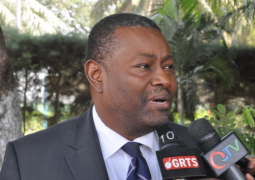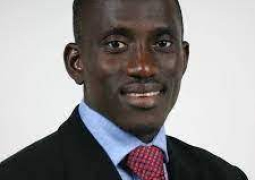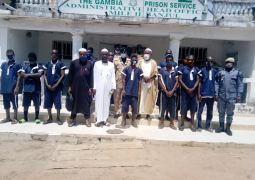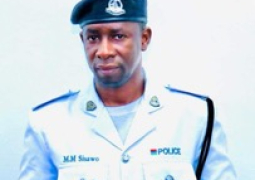All, mainly young and middle-aged women were drawn from various political backgrounds in the country. They were exposed to ideas, skills, tools and strategies to empower their participation and become effective leaders in the political space.
The project is aimed at strengthening the participation and increasing the representation of women in power and decision-making structures. The second workshop was held this week with a focus on effective communications, advocacy and public speaking.
Jarai Fayinkeh, 26 and UDP political activist from JanJang Bureh, CRR, who works as a teacher seems ready to face the men at the next round of elections in the country.
She said the 2016 elections have completely changed the face of politics in this country with a female presidential candidate and other dynamic members in both the National Assembly and the Local councils. She sees Ya Kumba Jaiteh, a nominated National Assembly Member (NAM) as her role model.
“This programme helped me to understand the trends in politics and political participation of women among others. I will begin by becoming an influencer within the party and training other women who did not have the opportunity to join us here.” she said.
Isatou Njie, Councillor, Banjul City Council and National Coordinator of Network of Locally Elected Women of Africa described the process as a new confidence building method imbued in the participants.
“My intention to contest for the next National Assembly elections has just been made easy with this training. Everything I learned here is new, except for public speaking. I now have a proper knowledge of planning and executing political activities in a comprehensive manner,” she said.
Fatoumatta Camara, 26, activist working with the civil society group, Peace Hub The Gambia, said she has political ambitions to run for office by 2026.
“Low participation of women in politics motivates me to advocate for that change. Sessions on public speaking and effective communications are necessary to enable me communicate effectively in imparting that change messages,” she said.
Currently, per the 2013 census, women represent 50.5% of the country’s population. However, very few women hold positions of power within political parties, in the civil service and other relevant decision-making structures including boards in civil society and private sector companies. This is what such training is seeking to address.
Programme coach Musu Bakoto Saho, winner of the ‘African of the Year 2020 Award’ for her commitment to ending violence against girls and women, fighting child marriage and female genital mutilation – and also the National Coordinator of Think Young Women, who also doubles as a gender lecturer at the University of The Gambia, said since she met these ladies from diverse political backgrounds, she had no doubt that they are special in their own ways.
“They had the passion and were interested in politics. But for the longest time, women have been sidelined to participate in politics and a lot of them lack the capacity to do so. That has been used as an edge by male counterparts over them,” she said.
Meeting these women since November and facilitating their first workshop and subsequent coaching sessions, Musu speaks highly of their commitment and dedication to learn more in order to engage meaningfully in politics.
In the beginning, it was a bit challenging for participants to learn and absorb the theories, principles and strategies around leadership. Moreover, the coaching sessions allowed them to put in practice the content covered during the workshop. The coaching session was a one-to-one two-month consultation that each and every participant had with Musu in which they identified and worked on their individual projects.
“Seeing them in the second round of this workshop convened after two months of practical coaching has been a different vibe altogether,” Musu Sawo said. “They were exceptional at practising what they were learning and were ready to work in achieving their political goals”.
The Country Representative of WFD in the Gambia Madi Jobarteh noted that while women are very visible in politics in The Gambia; however, their participation is not necessarily based on enlightened engagement.
The activity, he said was meant to change that culture in which women are seen and used mainly as mobilisers, cheerleaders and voters. Mr Jobarteh argued that women must abandon that traditional way of engagement in politics and rather become more active and engaging in an informed manner.
“This will require that women acquire the knowledge and skills of politicking and leadership and utilise that to strengthen and further their voice and representation in their parties and in national and local elective positions,” noted Jobarteh.





